UK & International Framework for CSR: A Corporate Analysis Report
VerifiedAdded on 2023/06/04
|8
|2127
|252
Report
AI Summary
This report provides an analysis of Corporate Social Responsibility (CSR) within both the UK and international contexts. It explores the significance of CSR for large corporations, highlighting its impact on brand perception, talent retention, and overall success. The report delves into four types of CSR efforts: charity work, volunteer projects, environmental initiatives, and ethical labor practices. It discusses the importance of CSR in attracting and retaining employees, improving customer perception, and enabling better consumer engagement. The analysis further examines environmental, ethical, philanthropic, and economic responsibilities, comparing practices in the UK and Australia. Ultimately, the report underscores the necessity for organizations to adopt CSR strategies for societal benefit and competitive advantage, emphasizing the role of labor laws and frameworks in guiding corporate responsibility efforts.
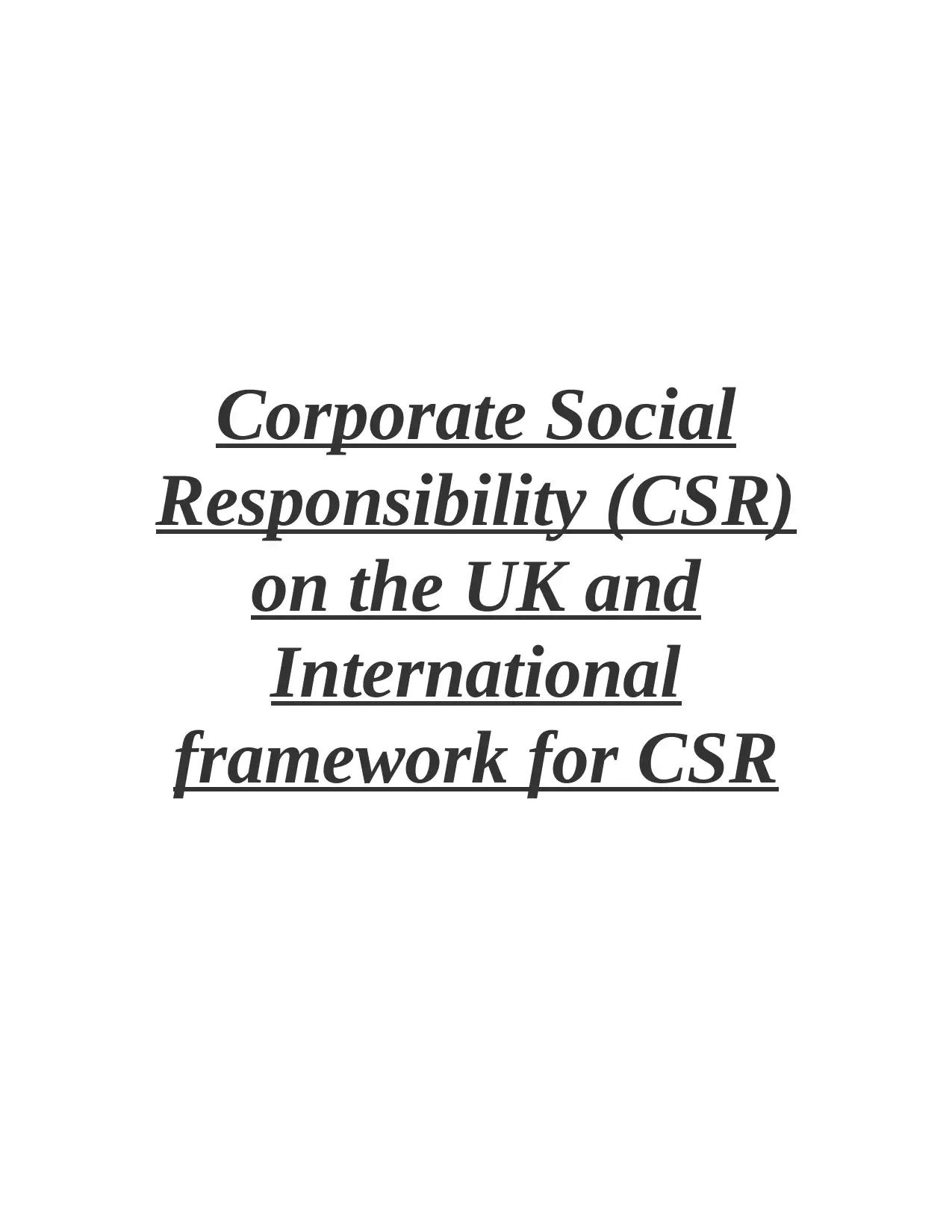
Corporate Social
Responsibility (CSR)
on the UK and
International
framework for CSR
Responsibility (CSR)
on the UK and
International
framework for CSR
Paraphrase This Document
Need a fresh take? Get an instant paraphrase of this document with our AI Paraphraser

Table of Contents
INTRODUCTION...........................................................................................................................3
MAIN BODY...................................................................................................................................3
CONCLUSION................................................................................................................................6
REFERENCES................................................................................................................................7
INTRODUCTION...........................................................................................................................3
MAIN BODY...................................................................................................................................3
CONCLUSION................................................................................................................................6
REFERENCES................................................................................................................................7
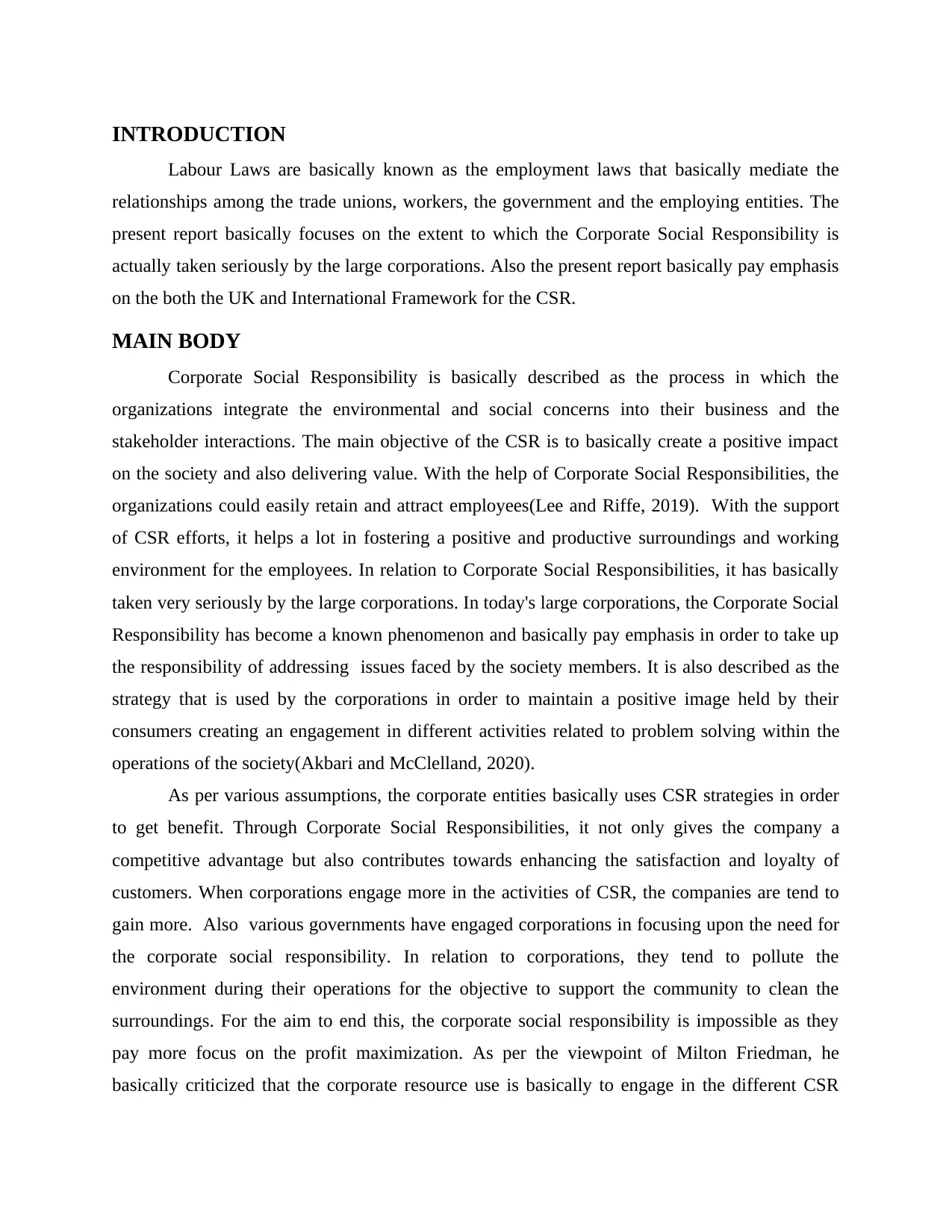
INTRODUCTION
Labour Laws are basically known as the employment laws that basically mediate the
relationships among the trade unions, workers, the government and the employing entities. The
present report basically focuses on the extent to which the Corporate Social Responsibility is
actually taken seriously by the large corporations. Also the present report basically pay emphasis
on the both the UK and International Framework for the CSR.
MAIN BODY
Corporate Social Responsibility is basically described as the process in which the
organizations integrate the environmental and social concerns into their business and the
stakeholder interactions. The main objective of the CSR is to basically create a positive impact
on the society and also delivering value. With the help of Corporate Social Responsibilities, the
organizations could easily retain and attract employees(Lee and Riffe, 2019). With the support
of CSR efforts, it helps a lot in fostering a positive and productive surroundings and working
environment for the employees. In relation to Corporate Social Responsibilities, it has basically
taken very seriously by the large corporations. In today's large corporations, the Corporate Social
Responsibility has become a known phenomenon and basically pay emphasis in order to take up
the responsibility of addressing issues faced by the society members. It is also described as the
strategy that is used by the corporations in order to maintain a positive image held by their
consumers creating an engagement in different activities related to problem solving within the
operations of the society(Akbari and McClelland, 2020).
As per various assumptions, the corporate entities basically uses CSR strategies in order
to get benefit. Through Corporate Social Responsibilities, it not only gives the company a
competitive advantage but also contributes towards enhancing the satisfaction and loyalty of
customers. When corporations engage more in the activities of CSR, the companies are tend to
gain more. Also various governments have engaged corporations in focusing upon the need for
the corporate social responsibility. In relation to corporations, they tend to pollute the
environment during their operations for the objective to support the community to clean the
surroundings. For the aim to end this, the corporate social responsibility is impossible as they
pay more focus on the profit maximization. As per the viewpoint of Milton Friedman, he
basically criticized that the corporate resource use is basically to engage in the different CSR
Labour Laws are basically known as the employment laws that basically mediate the
relationships among the trade unions, workers, the government and the employing entities. The
present report basically focuses on the extent to which the Corporate Social Responsibility is
actually taken seriously by the large corporations. Also the present report basically pay emphasis
on the both the UK and International Framework for the CSR.
MAIN BODY
Corporate Social Responsibility is basically described as the process in which the
organizations integrate the environmental and social concerns into their business and the
stakeholder interactions. The main objective of the CSR is to basically create a positive impact
on the society and also delivering value. With the help of Corporate Social Responsibilities, the
organizations could easily retain and attract employees(Lee and Riffe, 2019). With the support
of CSR efforts, it helps a lot in fostering a positive and productive surroundings and working
environment for the employees. In relation to Corporate Social Responsibilities, it has basically
taken very seriously by the large corporations. In today's large corporations, the Corporate Social
Responsibility has become a known phenomenon and basically pay emphasis in order to take up
the responsibility of addressing issues faced by the society members. It is also described as the
strategy that is used by the corporations in order to maintain a positive image held by their
consumers creating an engagement in different activities related to problem solving within the
operations of the society(Akbari and McClelland, 2020).
As per various assumptions, the corporate entities basically uses CSR strategies in order
to get benefit. Through Corporate Social Responsibilities, it not only gives the company a
competitive advantage but also contributes towards enhancing the satisfaction and loyalty of
customers. When corporations engage more in the activities of CSR, the companies are tend to
gain more. Also various governments have engaged corporations in focusing upon the need for
the corporate social responsibility. In relation to corporations, they tend to pollute the
environment during their operations for the objective to support the community to clean the
surroundings. For the aim to end this, the corporate social responsibility is impossible as they
pay more focus on the profit maximization. As per the viewpoint of Milton Friedman, he
basically criticized that the corporate resource use is basically to engage in the different CSR
⊘ This is a preview!⊘
Do you want full access?
Subscribe today to unlock all pages.

Trusted by 1+ million students worldwide
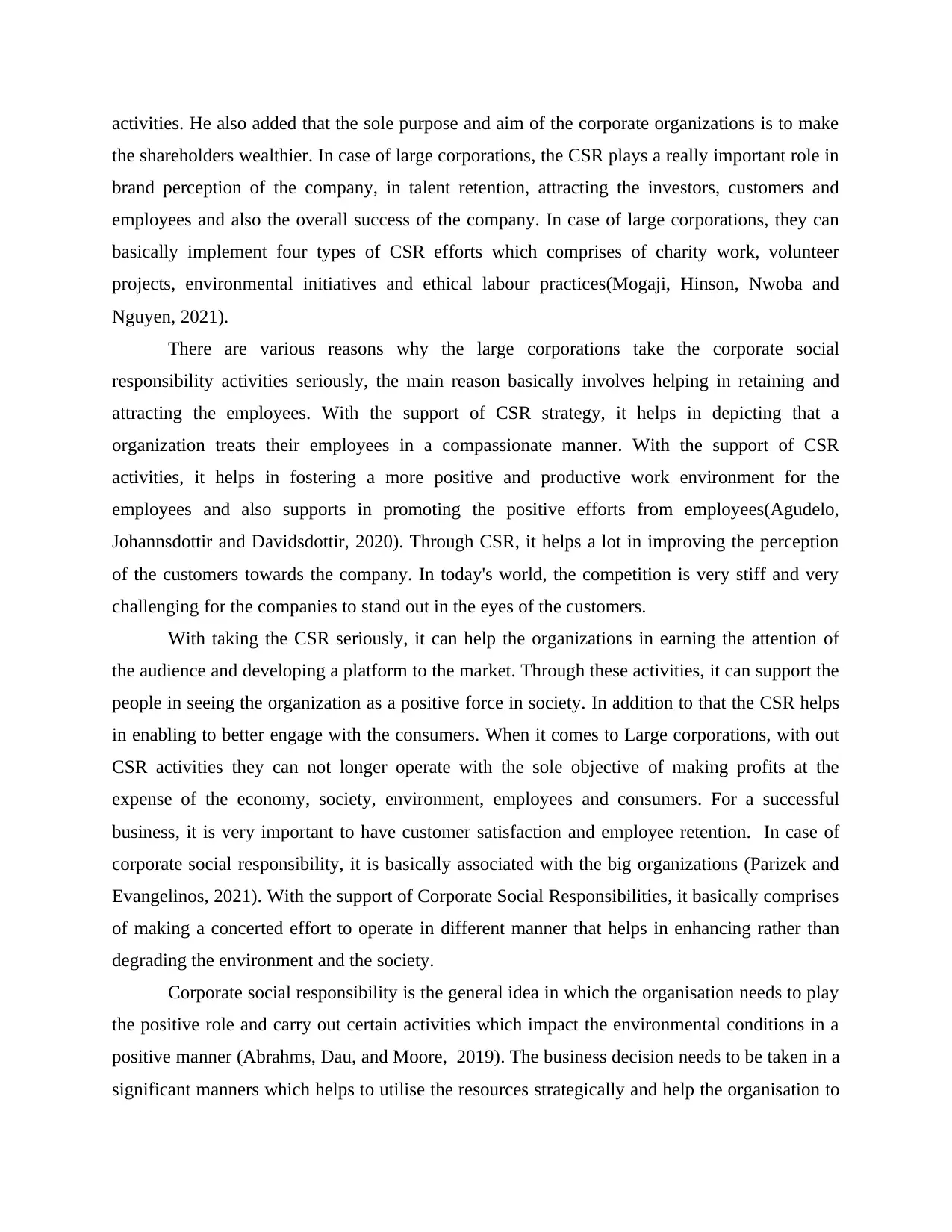
activities. He also added that the sole purpose and aim of the corporate organizations is to make
the shareholders wealthier. In case of large corporations, the CSR plays a really important role in
brand perception of the company, in talent retention, attracting the investors, customers and
employees and also the overall success of the company. In case of large corporations, they can
basically implement four types of CSR efforts which comprises of charity work, volunteer
projects, environmental initiatives and ethical labour practices(Mogaji, Hinson, Nwoba and
Nguyen, 2021).
There are various reasons why the large corporations take the corporate social
responsibility activities seriously, the main reason basically involves helping in retaining and
attracting the employees. With the support of CSR strategy, it helps in depicting that a
organization treats their employees in a compassionate manner. With the support of CSR
activities, it helps in fostering a more positive and productive work environment for the
employees and also supports in promoting the positive efforts from employees(Agudelo,
Johannsdottir and Davidsdottir, 2020). Through CSR, it helps a lot in improving the perception
of the customers towards the company. In today's world, the competition is very stiff and very
challenging for the companies to stand out in the eyes of the customers.
With taking the CSR seriously, it can help the organizations in earning the attention of
the audience and developing a platform to the market. Through these activities, it can support the
people in seeing the organization as a positive force in society. In addition to that the CSR helps
in enabling to better engage with the consumers. When it comes to Large corporations, with out
CSR activities they can not longer operate with the sole objective of making profits at the
expense of the economy, society, environment, employees and consumers. For a successful
business, it is very important to have customer satisfaction and employee retention. In case of
corporate social responsibility, it is basically associated with the big organizations (Parizek and
Evangelinos, 2021). With the support of Corporate Social Responsibilities, it basically comprises
of making a concerted effort to operate in different manner that helps in enhancing rather than
degrading the environment and the society.
Corporate social responsibility is the general idea in which the organisation needs to play
the positive role and carry out certain activities which impact the environmental conditions in a
positive manner (Abrahms, Dau, and Moore, 2019). The business decision needs to be taken in a
significant manners which helps to utilise the resources strategically and help the organisation to
the shareholders wealthier. In case of large corporations, the CSR plays a really important role in
brand perception of the company, in talent retention, attracting the investors, customers and
employees and also the overall success of the company. In case of large corporations, they can
basically implement four types of CSR efforts which comprises of charity work, volunteer
projects, environmental initiatives and ethical labour practices(Mogaji, Hinson, Nwoba and
Nguyen, 2021).
There are various reasons why the large corporations take the corporate social
responsibility activities seriously, the main reason basically involves helping in retaining and
attracting the employees. With the support of CSR strategy, it helps in depicting that a
organization treats their employees in a compassionate manner. With the support of CSR
activities, it helps in fostering a more positive and productive work environment for the
employees and also supports in promoting the positive efforts from employees(Agudelo,
Johannsdottir and Davidsdottir, 2020). Through CSR, it helps a lot in improving the perception
of the customers towards the company. In today's world, the competition is very stiff and very
challenging for the companies to stand out in the eyes of the customers.
With taking the CSR seriously, it can help the organizations in earning the attention of
the audience and developing a platform to the market. Through these activities, it can support the
people in seeing the organization as a positive force in society. In addition to that the CSR helps
in enabling to better engage with the consumers. When it comes to Large corporations, with out
CSR activities they can not longer operate with the sole objective of making profits at the
expense of the economy, society, environment, employees and consumers. For a successful
business, it is very important to have customer satisfaction and employee retention. In case of
corporate social responsibility, it is basically associated with the big organizations (Parizek and
Evangelinos, 2021). With the support of Corporate Social Responsibilities, it basically comprises
of making a concerted effort to operate in different manner that helps in enhancing rather than
degrading the environment and the society.
Corporate social responsibility is the general idea in which the organisation needs to play
the positive role and carry out certain activities which impact the environmental conditions in a
positive manner (Abrahms, Dau, and Moore, 2019). The business decision needs to be taken in a
significant manners which helps to utilise the resources strategically and help the organisation to
Paraphrase This Document
Need a fresh take? Get an instant paraphrase of this document with our AI Paraphraser
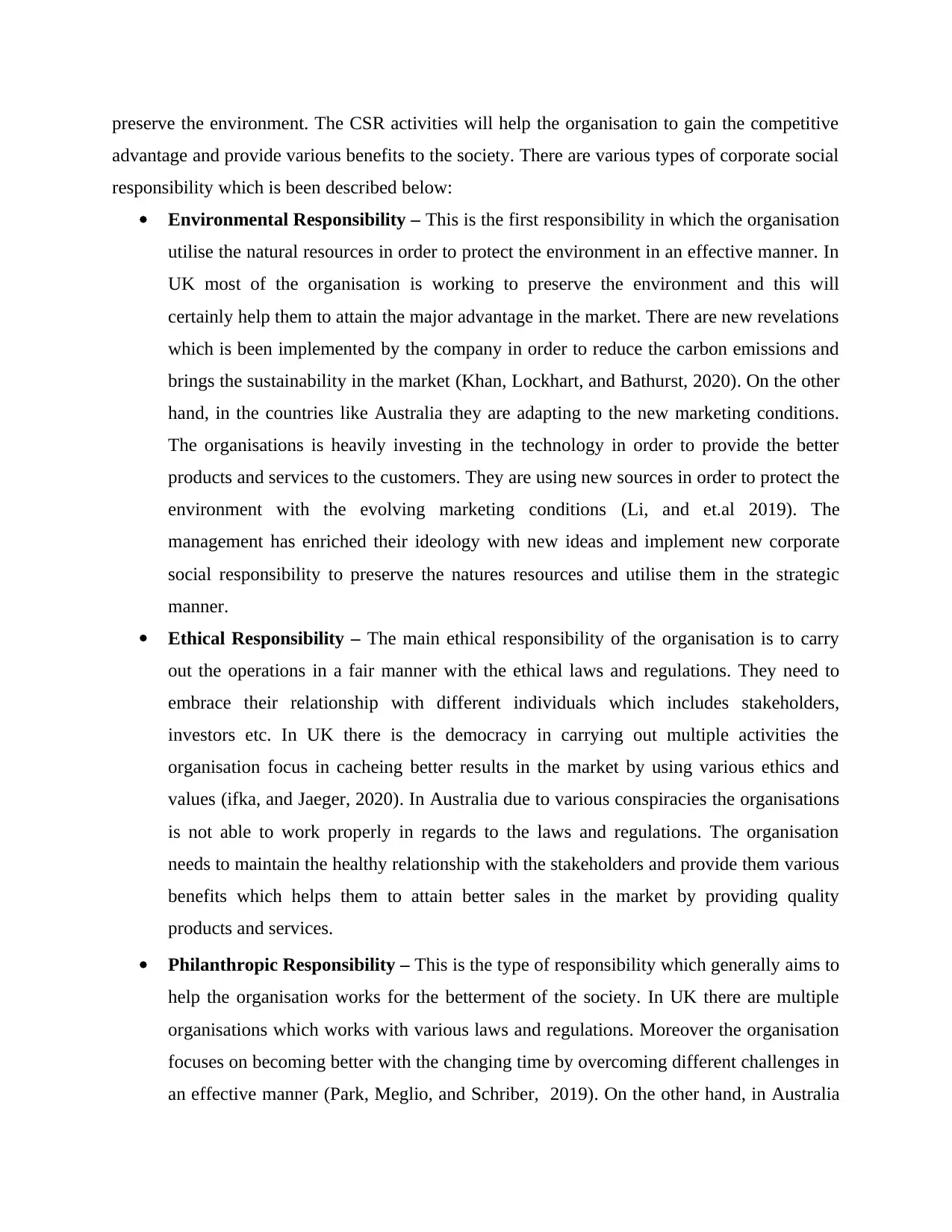
preserve the environment. The CSR activities will help the organisation to gain the competitive
advantage and provide various benefits to the society. There are various types of corporate social
responsibility which is been described below:
Environmental Responsibility – This is the first responsibility in which the organisation
utilise the natural resources in order to protect the environment in an effective manner. In
UK most of the organisation is working to preserve the environment and this will
certainly help them to attain the major advantage in the market. There are new revelations
which is been implemented by the company in order to reduce the carbon emissions and
brings the sustainability in the market (Khan, Lockhart, and Bathurst, 2020). On the other
hand, in the countries like Australia they are adapting to the new marketing conditions.
The organisations is heavily investing in the technology in order to provide the better
products and services to the customers. They are using new sources in order to protect the
environment with the evolving marketing conditions (Li, and et.al 2019). The
management has enriched their ideology with new ideas and implement new corporate
social responsibility to preserve the natures resources and utilise them in the strategic
manner.
Ethical Responsibility – The main ethical responsibility of the organisation is to carry
out the operations in a fair manner with the ethical laws and regulations. They need to
embrace their relationship with different individuals which includes stakeholders,
investors etc. In UK there is the democracy in carrying out multiple activities the
organisation focus in cacheing better results in the market by using various ethics and
values (ifka, and Jaeger, 2020). In Australia due to various conspiracies the organisations
is not able to work properly in regards to the laws and regulations. The organisation
needs to maintain the healthy relationship with the stakeholders and provide them various
benefits which helps them to attain better sales in the market by providing quality
products and services.
Philanthropic Responsibility – This is the type of responsibility which generally aims to
help the organisation works for the betterment of the society. In UK there are multiple
organisations which works with various laws and regulations. Moreover the organisation
focuses on becoming better with the changing time by overcoming different challenges in
an effective manner (Park, Meglio, and Schriber, 2019). On the other hand, in Australia
advantage and provide various benefits to the society. There are various types of corporate social
responsibility which is been described below:
Environmental Responsibility – This is the first responsibility in which the organisation
utilise the natural resources in order to protect the environment in an effective manner. In
UK most of the organisation is working to preserve the environment and this will
certainly help them to attain the major advantage in the market. There are new revelations
which is been implemented by the company in order to reduce the carbon emissions and
brings the sustainability in the market (Khan, Lockhart, and Bathurst, 2020). On the other
hand, in the countries like Australia they are adapting to the new marketing conditions.
The organisations is heavily investing in the technology in order to provide the better
products and services to the customers. They are using new sources in order to protect the
environment with the evolving marketing conditions (Li, and et.al 2019). The
management has enriched their ideology with new ideas and implement new corporate
social responsibility to preserve the natures resources and utilise them in the strategic
manner.
Ethical Responsibility – The main ethical responsibility of the organisation is to carry
out the operations in a fair manner with the ethical laws and regulations. They need to
embrace their relationship with different individuals which includes stakeholders,
investors etc. In UK there is the democracy in carrying out multiple activities the
organisation focus in cacheing better results in the market by using various ethics and
values (ifka, and Jaeger, 2020). In Australia due to various conspiracies the organisations
is not able to work properly in regards to the laws and regulations. The organisation
needs to maintain the healthy relationship with the stakeholders and provide them various
benefits which helps them to attain better sales in the market by providing quality
products and services.
Philanthropic Responsibility – This is the type of responsibility which generally aims to
help the organisation works for the betterment of the society. In UK there are multiple
organisations which works with various laws and regulations. Moreover the organisation
focuses on becoming better with the changing time by overcoming different challenges in
an effective manner (Park, Meglio, and Schriber, 2019). On the other hand, in Australia
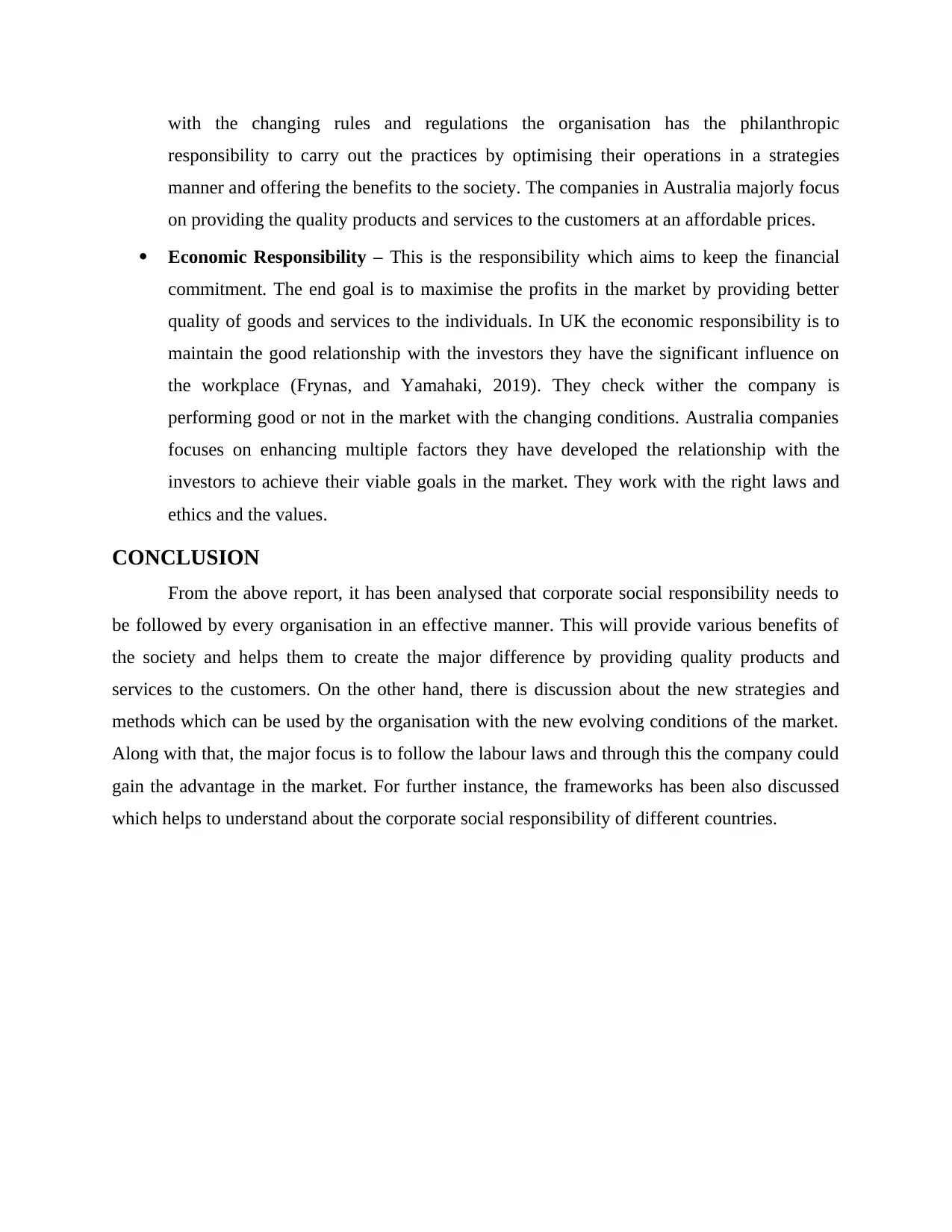
with the changing rules and regulations the organisation has the philanthropic
responsibility to carry out the practices by optimising their operations in a strategies
manner and offering the benefits to the society. The companies in Australia majorly focus
on providing the quality products and services to the customers at an affordable prices.
Economic Responsibility – This is the responsibility which aims to keep the financial
commitment. The end goal is to maximise the profits in the market by providing better
quality of goods and services to the individuals. In UK the economic responsibility is to
maintain the good relationship with the investors they have the significant influence on
the workplace (Frynas, and Yamahaki, 2019). They check wither the company is
performing good or not in the market with the changing conditions. Australia companies
focuses on enhancing multiple factors they have developed the relationship with the
investors to achieve their viable goals in the market. They work with the right laws and
ethics and the values.
CONCLUSION
From the above report, it has been analysed that corporate social responsibility needs to
be followed by every organisation in an effective manner. This will provide various benefits of
the society and helps them to create the major difference by providing quality products and
services to the customers. On the other hand, there is discussion about the new strategies and
methods which can be used by the organisation with the new evolving conditions of the market.
Along with that, the major focus is to follow the labour laws and through this the company could
gain the advantage in the market. For further instance, the frameworks has been also discussed
which helps to understand about the corporate social responsibility of different countries.
responsibility to carry out the practices by optimising their operations in a strategies
manner and offering the benefits to the society. The companies in Australia majorly focus
on providing the quality products and services to the customers at an affordable prices.
Economic Responsibility – This is the responsibility which aims to keep the financial
commitment. The end goal is to maximise the profits in the market by providing better
quality of goods and services to the individuals. In UK the economic responsibility is to
maintain the good relationship with the investors they have the significant influence on
the workplace (Frynas, and Yamahaki, 2019). They check wither the company is
performing good or not in the market with the changing conditions. Australia companies
focuses on enhancing multiple factors they have developed the relationship with the
investors to achieve their viable goals in the market. They work with the right laws and
ethics and the values.
CONCLUSION
From the above report, it has been analysed that corporate social responsibility needs to
be followed by every organisation in an effective manner. This will provide various benefits of
the society and helps them to create the major difference by providing quality products and
services to the customers. On the other hand, there is discussion about the new strategies and
methods which can be used by the organisation with the new evolving conditions of the market.
Along with that, the major focus is to follow the labour laws and through this the company could
gain the advantage in the market. For further instance, the frameworks has been also discussed
which helps to understand about the corporate social responsibility of different countries.
⊘ This is a preview!⊘
Do you want full access?
Subscribe today to unlock all pages.

Trusted by 1+ million students worldwide
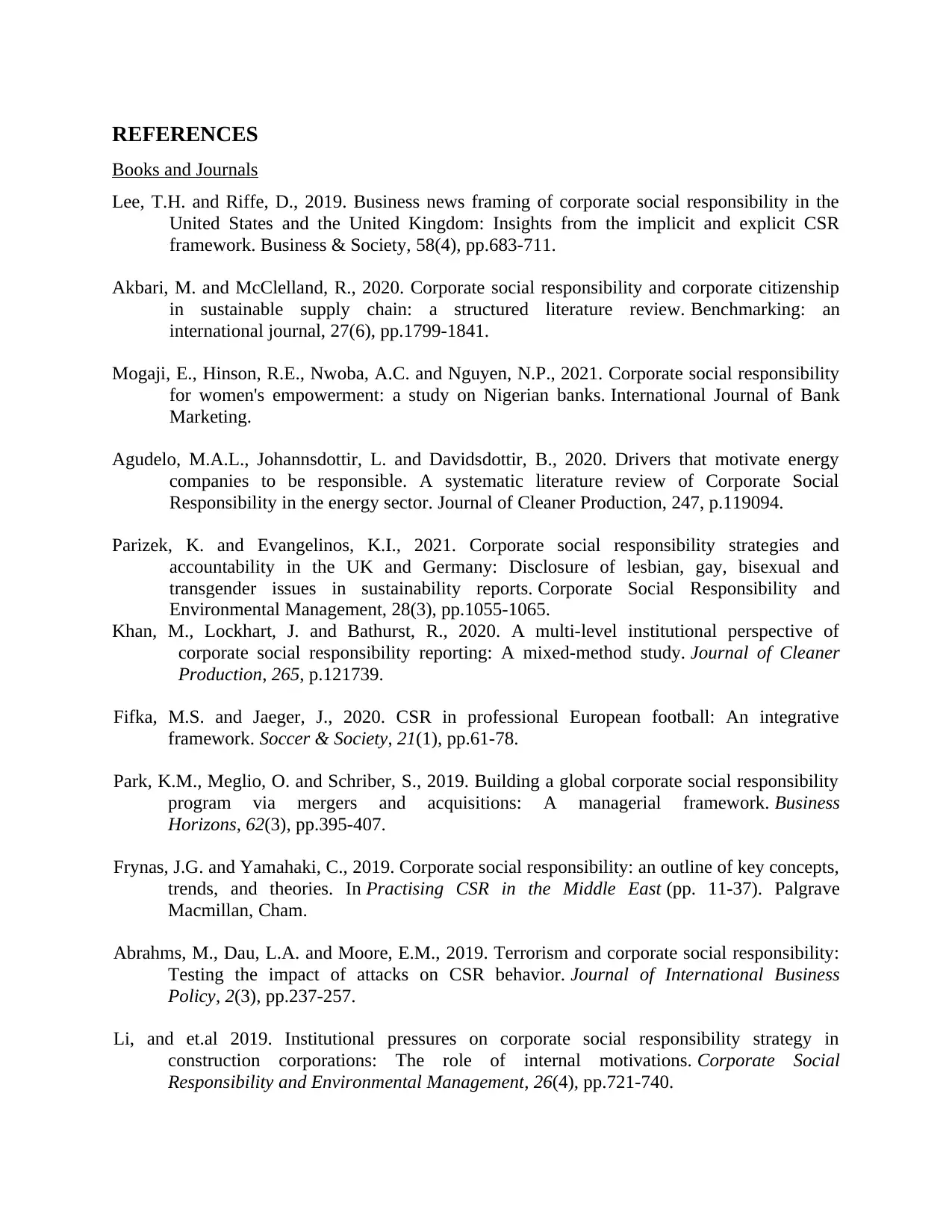
REFERENCES
Books and Journals
Lee, T.H. and Riffe, D., 2019. Business news framing of corporate social responsibility in the
United States and the United Kingdom: Insights from the implicit and explicit CSR
framework. Business & Society, 58(4), pp.683-711.
Akbari, M. and McClelland, R., 2020. Corporate social responsibility and corporate citizenship
in sustainable supply chain: a structured literature review. Benchmarking: an
international journal, 27(6), pp.1799-1841.
Mogaji, E., Hinson, R.E., Nwoba, A.C. and Nguyen, N.P., 2021. Corporate social responsibility
for women's empowerment: a study on Nigerian banks. International Journal of Bank
Marketing.
Agudelo, M.A.L., Johannsdottir, L. and Davidsdottir, B., 2020. Drivers that motivate energy
companies to be responsible. A systematic literature review of Corporate Social
Responsibility in the energy sector. Journal of Cleaner Production, 247, p.119094.
Parizek, K. and Evangelinos, K.I., 2021. Corporate social responsibility strategies and
accountability in the UK and Germany: Disclosure of lesbian, gay, bisexual and
transgender issues in sustainability reports. Corporate Social Responsibility and
Environmental Management, 28(3), pp.1055-1065.
Khan, M., Lockhart, J. and Bathurst, R., 2020. A multi-level institutional perspective of
corporate social responsibility reporting: A mixed-method study. Journal of Cleaner
Production, 265, p.121739.
Fifka, M.S. and Jaeger, J., 2020. CSR in professional European football: An integrative
framework. Soccer & Society, 21(1), pp.61-78.
Park, K.M., Meglio, O. and Schriber, S., 2019. Building a global corporate social responsibility
program via mergers and acquisitions: A managerial framework. Business
Horizons, 62(3), pp.395-407.
Frynas, J.G. and Yamahaki, C., 2019. Corporate social responsibility: an outline of key concepts,
trends, and theories. In Practising CSR in the Middle East (pp. 11-37). Palgrave
Macmillan, Cham.
Abrahms, M., Dau, L.A. and Moore, E.M., 2019. Terrorism and corporate social responsibility:
Testing the impact of attacks on CSR behavior. Journal of International Business
Policy, 2(3), pp.237-257.
Li, and et.al 2019. Institutional pressures on corporate social responsibility strategy in
construction corporations: The role of internal motivations. Corporate Social
Responsibility and Environmental Management, 26(4), pp.721-740.
Books and Journals
Lee, T.H. and Riffe, D., 2019. Business news framing of corporate social responsibility in the
United States and the United Kingdom: Insights from the implicit and explicit CSR
framework. Business & Society, 58(4), pp.683-711.
Akbari, M. and McClelland, R., 2020. Corporate social responsibility and corporate citizenship
in sustainable supply chain: a structured literature review. Benchmarking: an
international journal, 27(6), pp.1799-1841.
Mogaji, E., Hinson, R.E., Nwoba, A.C. and Nguyen, N.P., 2021. Corporate social responsibility
for women's empowerment: a study on Nigerian banks. International Journal of Bank
Marketing.
Agudelo, M.A.L., Johannsdottir, L. and Davidsdottir, B., 2020. Drivers that motivate energy
companies to be responsible. A systematic literature review of Corporate Social
Responsibility in the energy sector. Journal of Cleaner Production, 247, p.119094.
Parizek, K. and Evangelinos, K.I., 2021. Corporate social responsibility strategies and
accountability in the UK and Germany: Disclosure of lesbian, gay, bisexual and
transgender issues in sustainability reports. Corporate Social Responsibility and
Environmental Management, 28(3), pp.1055-1065.
Khan, M., Lockhart, J. and Bathurst, R., 2020. A multi-level institutional perspective of
corporate social responsibility reporting: A mixed-method study. Journal of Cleaner
Production, 265, p.121739.
Fifka, M.S. and Jaeger, J., 2020. CSR in professional European football: An integrative
framework. Soccer & Society, 21(1), pp.61-78.
Park, K.M., Meglio, O. and Schriber, S., 2019. Building a global corporate social responsibility
program via mergers and acquisitions: A managerial framework. Business
Horizons, 62(3), pp.395-407.
Frynas, J.G. and Yamahaki, C., 2019. Corporate social responsibility: an outline of key concepts,
trends, and theories. In Practising CSR in the Middle East (pp. 11-37). Palgrave
Macmillan, Cham.
Abrahms, M., Dau, L.A. and Moore, E.M., 2019. Terrorism and corporate social responsibility:
Testing the impact of attacks on CSR behavior. Journal of International Business
Policy, 2(3), pp.237-257.
Li, and et.al 2019. Institutional pressures on corporate social responsibility strategy in
construction corporations: The role of internal motivations. Corporate Social
Responsibility and Environmental Management, 26(4), pp.721-740.
Paraphrase This Document
Need a fresh take? Get an instant paraphrase of this document with our AI Paraphraser

1 out of 8
Related Documents
Your All-in-One AI-Powered Toolkit for Academic Success.
+13062052269
info@desklib.com
Available 24*7 on WhatsApp / Email
![[object Object]](/_next/static/media/star-bottom.7253800d.svg)
Unlock your academic potential
Copyright © 2020–2026 A2Z Services. All Rights Reserved. Developed and managed by ZUCOL.




